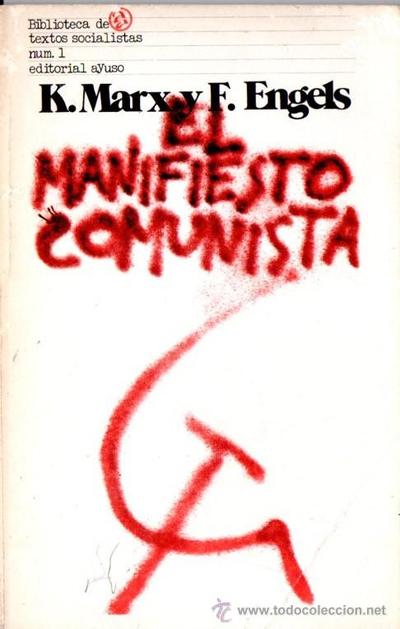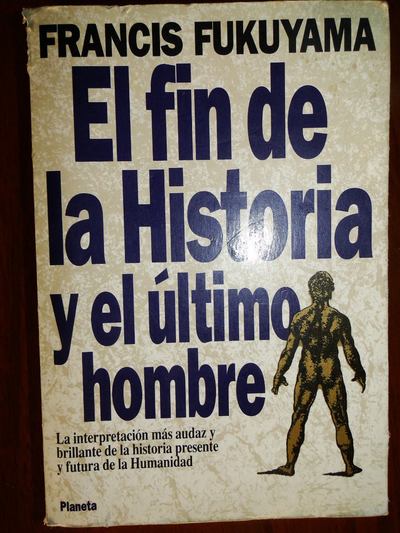|
Año 1848. Un fantasma recorría Europa. El fantasma del comunismo. El 21 de febrero de 1848 fue publicado en Londres por primera vez y en lengua alemana Manifest der Kommunistischen Partei, llamado simplemente “Manifiesto Comunista”. El Manifiesto Comunista acaba de cumplir 170 años.
Y me pregunto. Como las ideas que llegaron en aquel manifiesto han atravezado el tiempo e influencian nuestro hoy. Dos dias despues de la publicación del manifiesto, se inició una insurrecion popular en Paris que empujó al rey Luis Felipe Primero a abdicar. y dió paso a la Segunda republica. Esa fué la revolución francesa de 1848.Una oleada revolucionaria acabó con el predominio del absolutismo en toda Europa. La guerra civil americana que terminó con la proclamación de independencia para los esclavos de los estados confederados, comenzaría 11 años más tarde. Nada indica que el décimo sexto presidente de los Estados Unidos Abraham Lincoln se haya inspirado en lo que proclamaba el Manifiesto y las ideas marxistas que comenzaban a circular. Es sabido que Marx y Lincoln tuvieron un intenso intercambio epistolar al final de la Guerra civil. El escritor Robert Blackburn recoje en su libro "An unfinished revolution" todas las cartas que se enviaron Marx y Lincoln. “Desde el punto de vista de Marx, la Guerra Civil de 1861-65 en Estados Unidos constituyó una de las principales batallas del siglo para la emancipación humana, una que obligó a la clase obrera blanca tanto de Estados Unidos como de Gran Bretaña a tomar postura en contra de la esclavitud” . Eso lo dise Kevin Anderson en Marx at the Margins, . Nuestro gran Martí decía a la muerte de Marx : Ved esta gran sala. Karl Marx ha muerto. Como se puso del lado de los débiles merece honor. Pero no hace bien el que señala el daño y arde en ansias temerosas de ponerle remedio, sino el que enseña remedio blanco al daño. Espanta la tarea de echar a los hombres sobre los hombres. Indigna el forzoso abestiamiento de unos hombres en provecho de otros. Mas se ha de encontrar salida a la indignación de modo que la bestia cese sin que se desborde y espante. Ved esta sala la preside, rodeado de hojas verdes, el retrato de aquel reformador ardiente, reunidor de hombres de diversos pueblos, y organizador incansable y pujante. La Internacional fue su obra: vienen a honrarlo hombres de todas las naciones. La multitud, que es de bravos braceros cuya vista estremece y conforta, enseña más músculos que alhajas, más caras honradas que paños sedosos. Las ideas del manifiesto ayudaron a Lenin y los bolcheviques a tomar el Palacio de Invierno de San Petersburgo en 1917. Por primera vez esas ideas tuvieron la posibilidad de ponerse en práctica con un poder casi absoluto. La experiencia catapultó en 1991 con la desintegración del estado sovietico. Las ideas del manifiesto tambien progresaron en Asia con una China maoista que compite hoy con el coloso americano que Marx no imaginó. En Cuba, un joven abogado tomó el poder en 1959, diciendo que buscaba libertad y prosperidad para su pequeña nación. Su habilidad política le permitió ganar la confianza de todo un pueblo y tras la paulatina aplicación de las ideas del manifiesto, logró permanecer en el poder hasta su muerte, no antes dejar claro que y sus acólitos se consideraban marxista-leninista radicales. Otras experiencias de aplicar las ideas lanzadas en el manifiesto, han sido impulsadas por guerrillas o movimientos políticos en America Latina y Africa. Ninguna ha funcionado. Winston Churchill decia: El capitalismo es sin duda el peor sistema económico, a excepción de todos los otros que se probaron. Es decir que 170 años más tarde, y con la clara evidencia que la sustitución del capitalismo por el comunismo no funcionó, no hemos encontrado nada mejor. Derrida nos propone hacer el duelo de Marx y Fukuyama nos propone "El Fin de la Historia". Mientras tanto, el fantasma sigue recorriendo Europa y ahora recorre todo el mundo. Entonces me pregunto: Porqué tenemos tan poca imaginación ? Rafel Campoamor
1 Comment
More than a century ago, after many long, painful years of struggle and sacrifice, our nation - the Cuban nation - rid itself of Spanish colonialism and gained its “virtual” independence. I say “virtual” independence because after four years of occupation by our neighbors to the north, the Platt Amendment, the Estrada Palma election, his and subsequent administrations and policies, the Dirty War of 1912, Machado on up to Batista, the first sixty years of our existence as a nation were pock-marked with hits and misses but were also always under the watchful gaze of the "Giant from the North", whose ever-lurking presence cast a giant shadow over the real degree of "independence" and sovereignty that existed in our nation. Our northern neighbors (my current fellow US citizens) exerted a good deal of control over vast segments of our social, economic and perhaps more importantly, political life. We (like many fledgling nations do) were experiencing growing pains.
Some will say that, overall, we were blessed during these first sixty years, that our standard of living was among the highest in the Americas, and that before '59 Cuba was a prosperous, progressive nation seeking to grow itself into the world. Others remember a more somber Cuba. They remember a Cuba where few had much, some were successful, others lived well but their most lasting memory is that of a place where many, many people lived in sub-standard conditions and for much of the population - especially the Black population - day-to-day life on the ground was very difficult and there was little hope for their living conditions to improve. And then came ‘59! The second sixty years of our twelve decades of existence drastically changed our trajectory as a nation. Say what you will but the Cuban Revolution has fundamentally given the Cuban people remaining in the island (more than eleven and a half million souls) a different lens through which one should view life. The early reforms of the "Revolution" (the “Agrarian Reform”, the “Urban Reform”, "la libreta", etc.) paved the way for other tantalizing reforms that gradually grew into an understanding - for both the government and the governed - of a mutual acceptance of a much more "authoritarian” political compact. I doubt many thought beyond this convenient arrangement for the short term, and stopped to consider the potential consequences of this pact with the unknown. There is not much you can say about these last sixty years. After some substantial early gains in education and health, desegregating social clubs, beaches and schools, and addressing the most pressing needs of the most needy, Cuba gained some degree of global significance in the seventies and eighties fighting wars in Africa and Latin America. All the while Cuba continued thumbing its nose at Uncle Sam at a time when the "Cold War" gave the island a comfortable platform from which to launch its "wisdom and solidarity" as well as its piss and vinegar. Then came the crash landing from which the island has yet to recuperate. First the collapse of the Soviet mother-tit which provided basic necessities along the way and then "el periodo especial", which displayed in plain view the ineptitude and/or the unwillingness of the Cuban government to adapt to a new reality. Since then it has been mostly doomed-to-fail, pie-in-the-sky plans with other strong men in Latin America and elsewhere. Now there is a seemingly drying relationship with Venezuela. The results of the perennial “5-Year” plan remain characteristically elusive. The ideal man envisioned by The Revolution, “El Hombre Nuevo”, now only dreams of making a new life abroad by any means necessary. There is no light at the end of this tunnel! But I digress. I believe that we must look back in our history, draw some conclusions and figure out what we do from here. So I pose two questions which I believe are pertinent and give you my humble take on both of them. 1) How have Cubans of African descent fared in these one hundred and twenty years? Not so well, from my vantage point. During the early part of the first sixty years, our AfroCubans ancestors were dismissed as insignificant contributors in the struggle for liberation from Spanish rule. Years later, in 1912, our best and brightest were marginalized, persecuted and ultimately annihilated, pushed aside like pests. We did maintain some level of involvement in the social fabric through segregated societies, relatively few businesses ventures, our religions and our national folklore. Though we were by no means on equal terms with our Cuban brothers of “lighter complexion”, we tried to get along and find ways to better ourselves and our families. The last sixty years started with lofty promises of a more just society, and for Black Cubans in particular, a society where the color of a person’s skin would not pre-determine his or her chances to compete, fairly and fully, in a color-blind marketplace of whatever political system or ideology. No such luck!!! Six decades after the advent of “El Hombre Nuevo”, the very old men running the government, the military, the “nouveau riche” entrepreneur, the "apparatchik", at their highest levels, they are all still entities in the hands of the few, and those few still aren’t us. With the tepid "opening" between our two nations over the last few years, concerns of inequality have become more common. New entrepreneurs rely on funds from "familia en el extranjero" and those family connections are not proportional to the racial make-up of the Cuban people. Again, we are by no means on equal terms with our Cuban brothers from another mother, but we try to get along and find ways to better ourselves and our families. On my recent visits to the island I have spoken with many Black Cubans who still value the achievements of The Revolution. They talk about their education, the opportunities that were made available to them, the possibilities that may still develop and more. A few mention victories in Africa or successes in sports or other endeavors. I absolutely value and respect their point of view. Besides, after 55 years on the north side of the Florida Straights, who am I to contradict them? I’ll let others debate which sixty year period was better and which was worse for us. But I see what I see. And what I see is that Black Cubans are still at the very bottom of the social latter. What I see is that whichever shared misery our country endures tends to be more rigorous for its darkest people. But, for comfort, I also see a significant number of younger Black Cubans who are smart, well educated, well informed, well connected and very much aware of the historical opportunities (and challenges) they may encounter along their path. Cuba will be a better place if they have any say in its future. Either way, we need to prepare for the next 120 years. Our new, miniaturized Comandante en Jefe has promised to give up a piece of his power soon (which is doubtful) but whether he does or not, the fact is that he is feeble, immensely old and Mother Nature always has the last word in these matters. Whoever assumes power - whether a monarchic Castro, a powerful man in uniform, a hand-picked bureaucrat or whoever inherits that mess - would undoubtedly bring new ideas, form new bonds. Which brings me to my second question. It is actually a speculative question: 2) How will we fare in the next 60 years, the next century, the next 120 years? Hard to say. The transition has already begun. The train has left the station. We need to find our way aboard. We need to force our way for a seat at the dining car table because if we are not at the table, once again - as has been the norm for the last twelve decades and much before that - we will be merely an entree on the menu. Innegablemente somos parte de un único e indivisible reino que es la humanidad.
Las divisiones, conflictos y confrontaciones que se escudan tras la pertenencia a distintos grupos étnicos son producto de la avidez con la que algunos deciden hacerse con el poder y la riqueza. Si bien desde la perspectiva antropológica las tesis discriminatorias se ven cada día mas aisladas subsisten tenaces secuelas en el ámbito social y económico que entorpecen el necesario proceso de integración de las personas. Es fundamental, en particular para todos aquellos que mostramos un mayor o menor grado de ascendencia africana, comprender que la imperiosidad de la integración y los prejuicios raciales no están ceñidos a negro vs blanco. Existen prejuicios en otros ámbitos que por ser menos conocidos azotan con sorprendente impunidad a millones de personas; baste sólo mencionar el recelo y distanciamiento que reinan entre los mexicanos de tez más clara y aquellos que no pueden ocultar su origen indígena. La lucha por la integración plena de los hombres y mujeres es no sólo un derecho sino un deber; no obstante, resulta frustrante ver como muchos se dejan manipular y encasillar solo por ser parte de un grupo. En nuestro país los hispanos dan por descontado pertenecer al bando demócrata al igual que los afroamericanos. Esto es tan estrecho, estereotipado, racista y absurdo como lo fue en su momento la afiliación de la enorme mayoría de los negros americanos al partido republicano. El equilibrio entre la individualidad y la raza se rompe cuando actuamos como manada antes de actuar como ser humano. Durante los dos períodos presidenciales de Barack Obama recuerdo la desconsolada e irritada expresión en los rostros de aquellos que me escuchaban criticarlo sin medios términos. En el caso de nuestro país de origen, Cuba, noto con extrema preocupación como una enorme porción de mis compatriotas negros priorizan la lucha contra los prejuicios raciales por encima de la tenaz, perenne y meridiana denuncia de La Junta de La Habana y sus desmanes; muchos muestran una tolerante objetividad hacia quienes nos sacaron a puntapiés de nuestra casa mientras saltan como felinos en celo al escuchar la mínima alusión racial. Personalmente no albergo ningún sentimiento contrario al verticalismo como tampoco me molestan la objetividad y la tolerancia siempre que cualquiera de las dos opciones sea aplicada con coherencia. Pensar que habremos logrado algo si cubanos de todos los colores disfrutan de las mismas ínfimas oportunidades que el paramo que la dictadura ha creado puede ofrecer es pueril y simplista. La lucha por la derrota de los prejuicios raciales en la isla debe ir de la mano de la encarnizada batalla en todos los niveles por deshacernos del pernicioso lastre del castrocomunismo. La igualdad en la nulidad no me interesa: debemos luchar por la paridad de oportunidades en una Cuba próspera y prometedora. La raza no es enemiga del individuo, antes al contrario, es una de las inherentes particularidades del mismo. No obstante, la raza no puede nublar la visión ni limitar la perspectiva del individuo pues en el preciso momento que esto ocurra caeremos en muchos de esos prejuicios y clichés que tanto aborrecemos. Mi raza determina mi genotipo, mi propensión a ciertas enfermedades y mis mayores defensas contra otras. Mi raza incluso determina mi mayor comprensión de ciertas sensibilidades respecto a otras, pero soy yo, como individuo quien no cae rehén de mis características raciales y quién, en última instancia, recoge las sensibilidades de mi raza así como TODAS las demás y las coloca delicadamente en la canasta de la sensibilidades de las razas, inclinaciones y persuasiones. Es mi individualidad lo que da plena libertad a mi raza y la inserta en el contexto y la dinámica de mis hermanos los demás seres que habitan nuestro bello y martirizado planeta. Andres Alburquerque. Communications and Media Director. Afro Cuban Forum. |



 RSS Feed
RSS Feed
